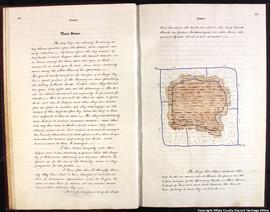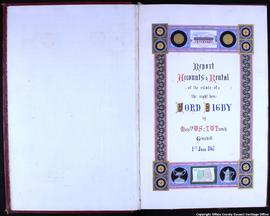Original incoming and copy outgoing letters relating to Lewis Goodbody's management of the Digby estate. Matters referred to include: the death of estate bailiff, Nesbitt and arrangements to look after his widow; illegal tree felling on the estate; proposed purchase of the wood, village, castle site and two bogs in Geashill by Hon. Brinsley Plunkett in order to obtain shooting rights; arrangements for a summer visit of the Digbys to Ireland; illegal game-shooting on the estate; sale of timber from Derrygunnigan Wood; and income tax.
Includes copy letter from Goodbody to Digby: 'Following my letter yesterday I now learn that the above [Honorable B. Plunkett] has supplied himself already with a number of pheasant boxes in anticipation, which is all to the good. I think it will be just as well to disappoint him on this occasion, for to my mind, he has rather overreached himself...All being well next Winter, it might be that you could spare the time to come over here, and shoot over your property, including the Geashill side. I think you would pick up quite a nice lot of woodcock, and it would show Plunkett that he is not yet the owner of Geashill, and that if he wants his sporting amenities, and you are inclined to deal with him for that part of the property, then he must pay a proper price for it, otherwise he must do without it. In present circumstances, I would not advise you to sell him the woods and bogs unless he takes the Castle site as well, and all at a proper price, which would be worth your while to consider. He seems to be suffering somewhat from swelled head.' (5 March 1930)
Includes letter from Maggie Evans, tenant to Goodbody: 'I quite forgot to tell you when you were down looking at the house and porch that rain comes in in several places in the kitchen and also in the room. And the thatch is very bad at the end of the house and there is a crack in the wall from top to the bottom of wall. It is also cracked very much inside too and I afraid of it falling out, and in few places the bottom of the walls are falling too so hoping you will be as kind as to get them repaired for me when getting the house done. (18 July 1931)


